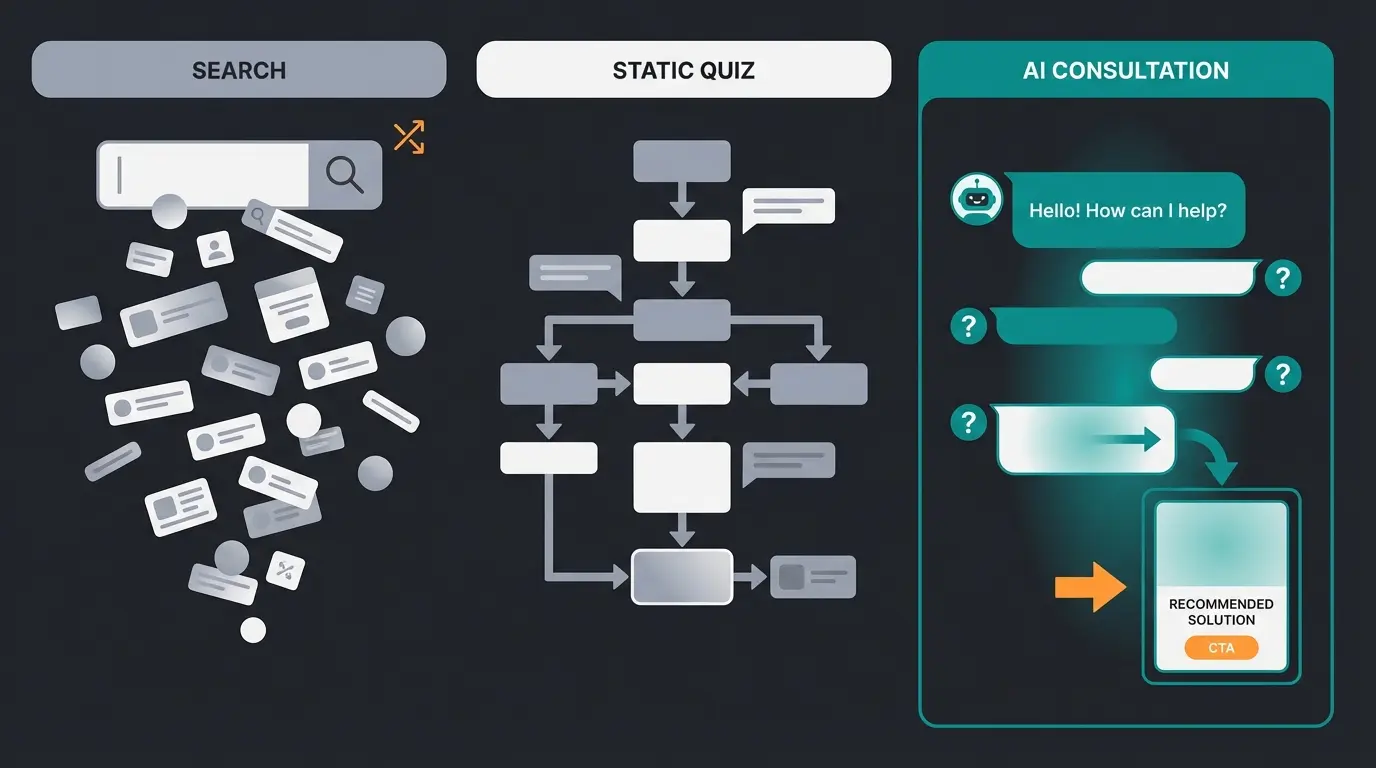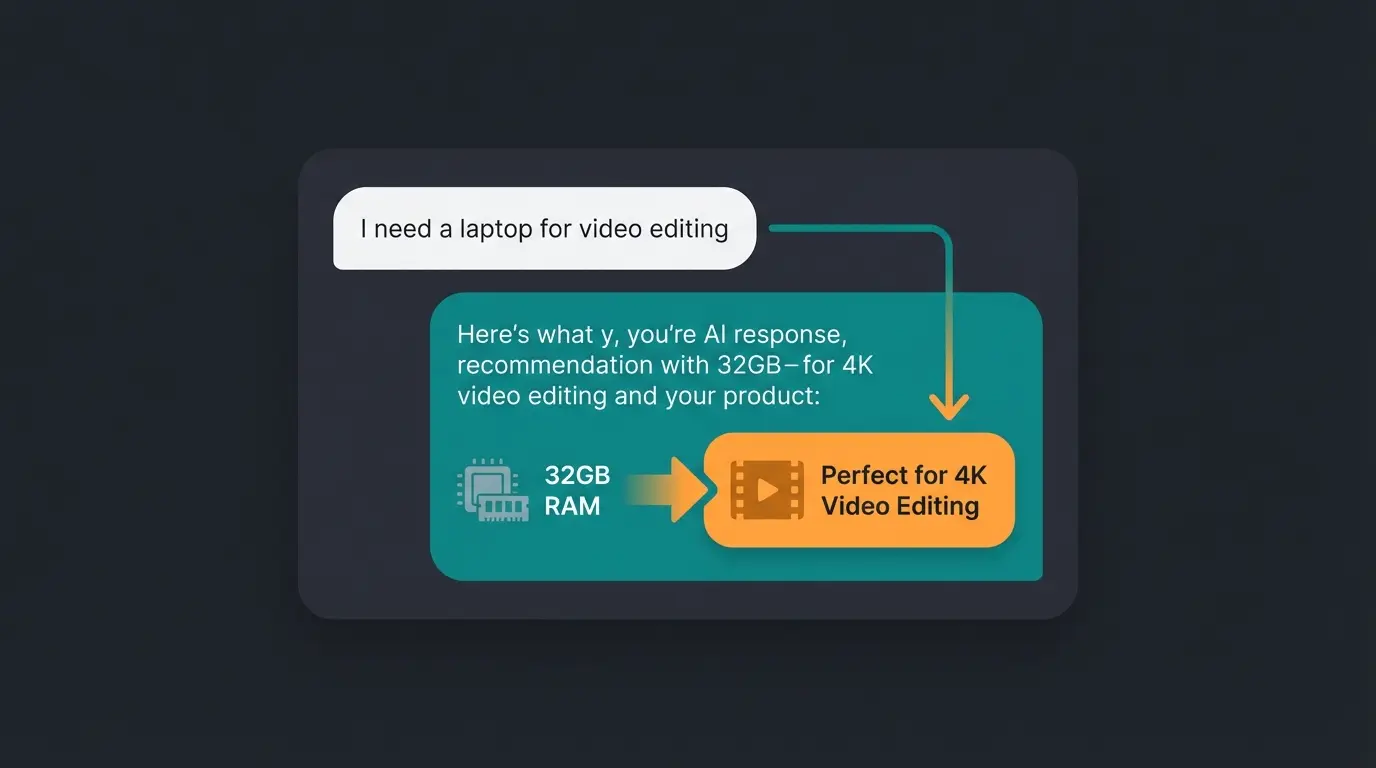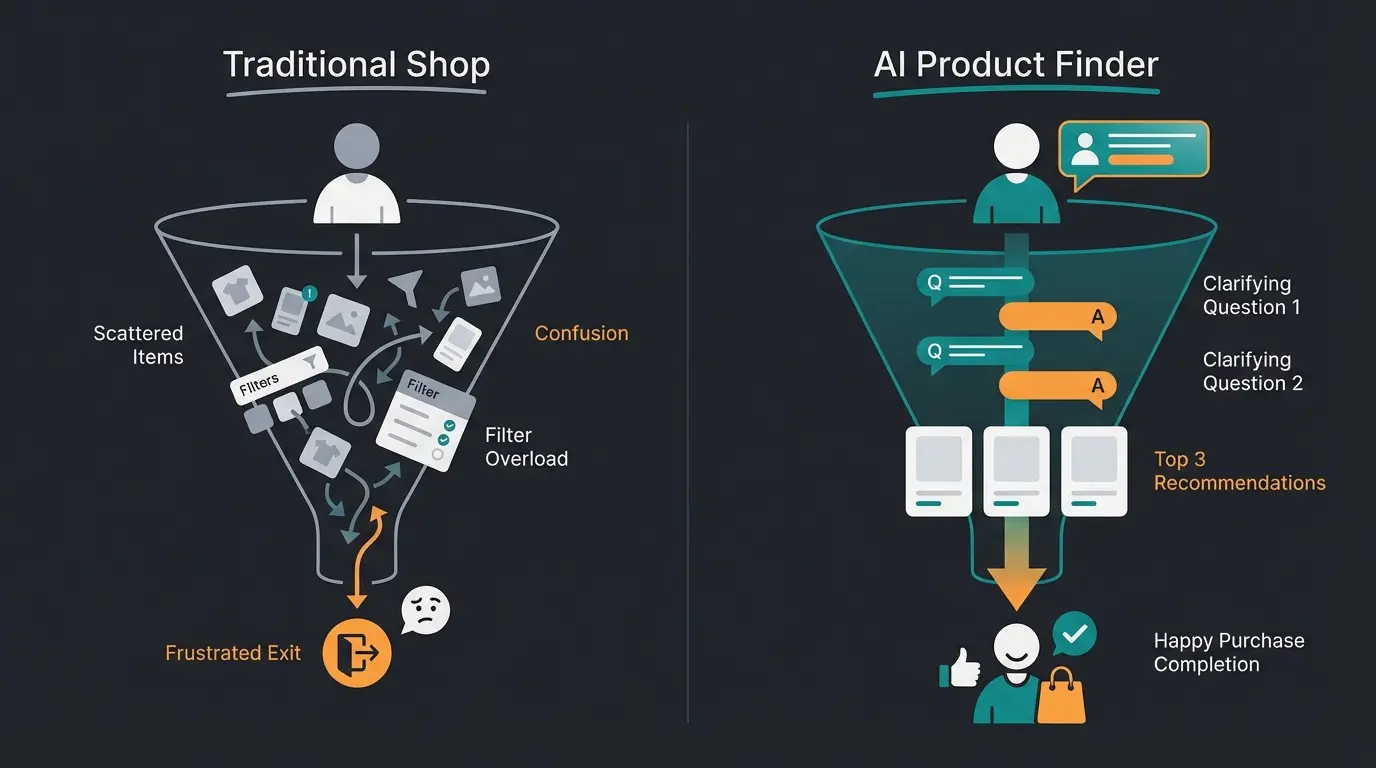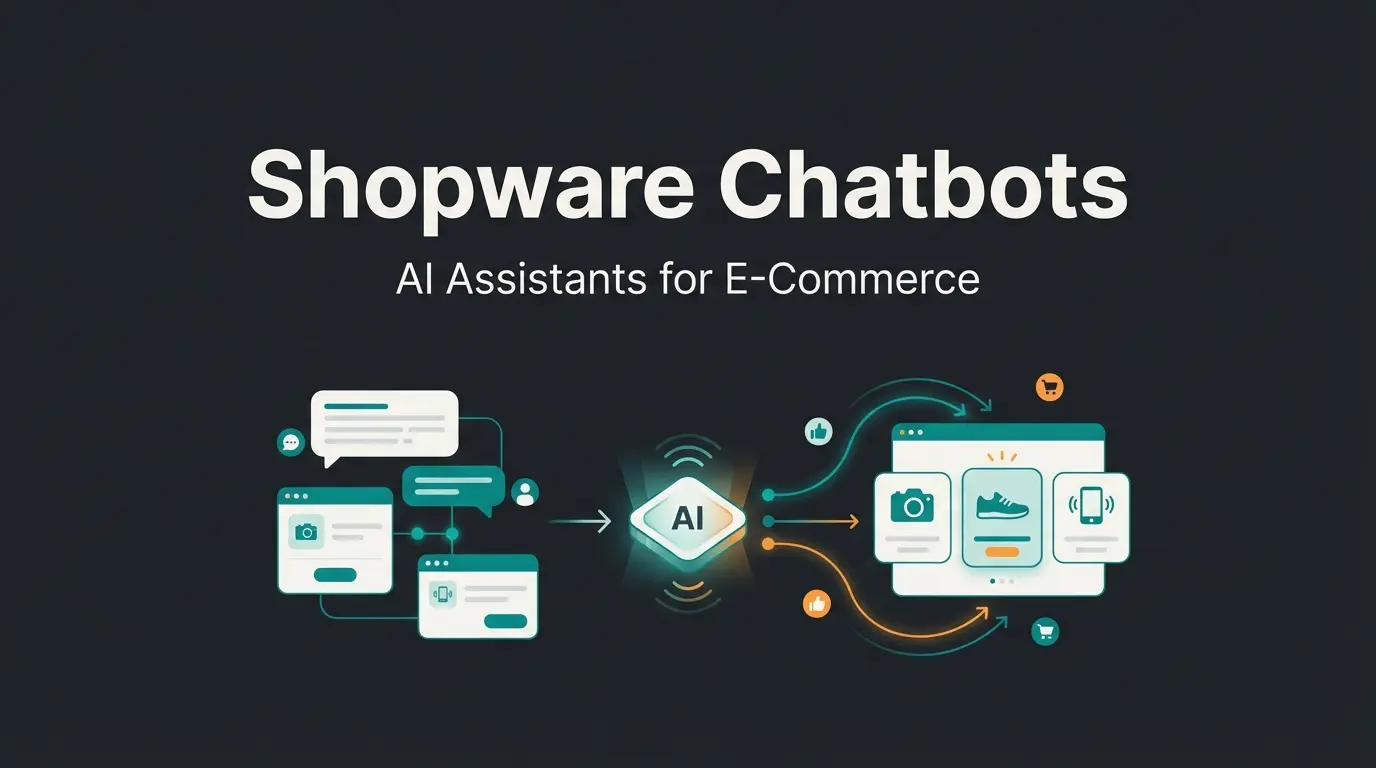Introduction: The Choice Overload Problem
Every online shopper knows the feeling: You visit a store with 10,000 products, type something vague into the search bar, and receive 500 results. Then comes the endless filtering—price range, brand, color, size—and you're still left with 50 options. Frustrated, you leave. This phenomenon, known as choice overload, is the silent killer of e-commerce conversions.
AI product finders are emerging as a central tool for modern online shops, specifically designed to combat this paralysis of choice. These intelligent systems leverage machine learning and artificial intelligence to suggest suitable products and simplify the purchasing process. The German e-commerce market demonstrates the enormous potential for this technology, with revenue reaching 85 billion euros in 2023.
The integration of AI product finders into existing online shops enables a significant increase in conversion rates and improves the shopping experience. According to current studies, AI-powered consultation systems increase the average cart value by up to 35%.
The German e-commerce market is characterized by research-oriented customers who seek comprehensive information before making a purchase. AI product finders address this behavior through precise, personalized recommendations, thereby building trust with buyers. But here's the crucial distinction: the era of static filters is over. The era of digital product consultation has begun.
What Is an AI Product Finder? Definition & Distinction
An AI product finder is fundamentally different from what most e-commerce platforms call 'product finders' today. It's not just a fancy filter system or a pre-programmed quiz. A true AI product finder functions as a Digital Sales Assistant—it consults, understands context, and adapts to each customer's unique needs in real-time.
To understand its value, we must distinguish it from three common alternatives that many merchants mistakenly believe are equivalent:
- Standard Search: Passive text matching that assumes customers know exactly what they want. Type 'laptop' and get 500 laptops with no guidance.
- Static Quizzes: Rigid if/then decision trees built on predefined paths. One unexpected answer, and the logic breaks.
- FAQ Bots: Reactive support tools designed for post-sale questions, not pre-sale consultation. They answer 'Where is my order?' not 'What product fits my needs?'
A true AI product finder combines natural language understanding with dynamic context awareness. When a customer says 'I need a washing machine for a family of five with a dog,' the AI doesn't just filter by capacity—it recommends models with large drums (perfect for families) AND pet hair removal features (addressing the unstated need).

Search vs. Consultation: The Fundamental Difference
The distinction between 'product search' and 'product consultation' represents a paradigm shift in e-commerce thinking. Search assumes the customer knows what they want. The customer types a query, the system matches keywords, and results appear. This works perfectly when someone searches for 'iPhone 15 Pro 256GB Black'—they've already made their decision.
Consultation helps customers who don't know what they want. And here's the critical insight: the vast majority of your potential customers fall into this category. They know they need a laptop, but they don't know whether they need 8GB or 16GB of RAM. They want a 'good' TV but can't distinguish between OLED and QLED. This is where static filters fail and AI consultation excels.
Consider the translation problem: Your product database contains technical specifications—'9kg drum capacity,' '1400 RPM spin speed,' 'A+++ energy rating.' Your customers think in terms of needs—'good for a big family,' 'quiet enough for apartment living,' 'won't destroy my electricity bill.' An AI product finder bridges this gap automatically, translating technical features into customer benefits.
| Feature | Static Product Finder (Old Way) | AI Product Consultant (Modern Solution) |
|---|---|---|
| Logic | Pre-defined if/then decision tree | Dynamic contextual understanding |
| User Input | Multiple choice buttons only | Natural language chat + buttons |
| Flexibility | Breaks if user has unique needs | Adapts to unexpected questions |
| Maintenance | High (manual updates required) | Low (auto-syncs with product feed) |
| Primary Goal | Filter reduction | Consultative selling |
| Technical Translation | None—shows raw specs | Converts specs to customer benefits |
| Brand Voice | Generic, robotic responses | Adopts brand personality |
Benefits of AI Product Finders for Online Retailers
Personalized Product Recommendations
Automatic customer profiling through AI systems enables tailored product suggestions in real-time. Modern AI solutions analyze customer behavior, historical purchases, and current interests to generate relevant recommendations.
Unlike static recommendation engines that simply show 'customers also bought,' AI product finders understand the why behind purchase decisions. This deeper understanding leads to recommendations that feel genuinely helpful rather than algorithmic and impersonal.
User Experience Optimization
A simplified product search significantly reduces frustration and cart abandonment. Current analyses show that optimized search functions can reduce abandonment rates by up to 30%.
The psychological impact shouldn't be underestimated. When customers feel understood—when the AI asks the right follow-up questions and acknowledges their specific situation—they develop what psychologists call 'confidence to buy.' This emotional certainty translates directly into completed purchases.
Conversion Rate Optimization
The integration of AI product finders leads to measurable improvements in shop performance. Industry statistics document conversion rate increases averaging 15-25%.
But conversion rate alone doesn't tell the full story. Consider introducing 'Time-to-Decision' as a metric—how quickly customers move from browsing to purchasing. AI product finders dramatically reduce this timeline by eliminating the research phase that traditionally happens outside your store.
Efficiency Gains for Shop Operators
The automation of customer consultation through AI systems enables significant cost savings in customer service. Shop operators benefit from reduced personnel costs while simultaneously improving consultation quality and ensuring 24/7 availability.
Average improvement after AI product finder implementation
Increase in average order value through smart upselling
Fewer customer service inquiries needed
Better advice leads to fewer wrong purchases
Average AI response time to customer queries
Data Insights: Learning the Why
Traditional analytics tell you what customers buy. AI product finders reveal why they buy. Every conversation generates insights about customer motivations, pain points, and decision factors that would otherwise remain invisible.
This data goldmine enables continuous product assortment optimization, better inventory planning, and more effective marketing messaging. You're not just selling—you're learning from every interaction.
Technology: How AI Consultation Actually Works
Understanding the technology behind AI product finders helps merchants make informed implementation decisions. Modern systems combine several key components to deliver intelligent, context-aware recommendations.
At the core, AI product finders use Large Language Models (LLMs) to understand natural language queries. Unlike keyword matching, these models grasp intent and context. When a customer writes 'something for my grandmother's 80th birthday,' the AI understands this implies considerations about ease of use, traditional aesthetics, and appropriate price points—none of which were explicitly stated.
The AI connects to your product data feed through API integration, maintaining a real-time understanding of your inventory, pricing, and product attributes. This synchronization ensures recommendations are always accurate and available products are suggested.
Brand Voice: The Consultant Persona
One critical yet often overlooked aspect of AI product finders is brand voice integration. A luxury fashion retailer's AI should speak differently than a discount electronics store's assistant. The technology allows for personality customization:
- Professional & Authoritative: Suitable for B2B, technical products, financial services
- Friendly & Approachable: Ideal for lifestyle brands, everyday consumer goods
- Witty & Playful: Perfect for youth-oriented brands, entertainment products
- Technical & Detailed: Appropriate for specialist retailers, enthusiast communities
This isn't just cosmetic—brand voice directly impacts trust and conversion. Customers unconsciously judge whether the 'salesperson' (AI) matches the brand image they expect.

Implementation of an AI Product Finder
The integration of an AI product finder into an existing online shop requires a structured approach. Proper planning and execution is the key to successful AI-powered product consultation.
Technical Requirements
A modern shop system forms the foundation for AI product finder integration. The technical infrastructure must support REST APIs and ensure a stable internet connection. Particularly important are current SSL encryption and regular backups of the product database.
GDPR-compliant data storage is central to privacy requirements. Customer data must be transmitted encrypted and stored on European servers. A privacy policy transparently informs customers about how their data is used.
System Integration
Technical integration occurs via an API interface. The product database synchronizes with the AI system to enable precise recommendations. A JavaScript snippet embeds the product finder into the shop interface.
The integration encompasses these steps:
- Data Preparation: Structuring product data and attributes for AI consumption
- API Configuration: Setting up interfaces and authentication protocols
- Frontend Integration: Embedding the chat widget into the shop design
- Testing: Comprehensive testing of functionality and performance
Analyze existing product data structure, identify gaps in attributes and descriptions
Configure secure connections between shop system and AI platform
Customize AI personality, tone, and product knowledge to match brand identity
Embed chat interface with responsive design matching shop aesthetics
Limited rollout with subset of products, gather user feedback
Complete deployment with ongoing monitoring and optimization
Best Practices for Implementation
A phased introduction with a test period minimizes risks. The AI should initially be trained with a limited product catalog. Feedback from test customers helps optimize recommendation quality.
A dedicated project team oversees the implementation. Regular updates of product data and continuous AI training ensure recommendation quality. Clear documentation facilitates later adjustments.
Cost Factors and ROI
Costs consist of various components. The initial investment includes the software license and any adaptations to the shop system. Ongoing costs arise from hosting, support, and regular updates.
ROI calculation is based on measurable factors such as revenue increase, reduced return rate, and saved personnel costs in customer service. Amortization typically occurs within 6-12 months, with many implementations seeing positive ROI within 3-6 months.
Stop losing customers to choice overload. Our AI product finder engages shoppers in natural conversations, guiding them to the perfect product while you focus on growing your business.
Start Your Free TrialChallenges and Solutions: Building Trust
Every new technology faces skepticism, and AI product finders are no exception. Addressing these concerns proactively is essential for successful adoption.
The Hallucination Problem
One of the most significant concerns about AI systems is 'hallucination'—the AI inventing products or features that don't exist. This is a legitimate worry that reputable AI product finder solutions address through multiple safeguards:
- Grounded Responses: The AI can only recommend products that exist in your synchronized product feed
- Verification Layers: Every product mentioned is checked against real inventory before recommendation
- Confidence Thresholds: If the AI isn't certain about a match, it asks clarifying questions rather than guessing
- Human Escalation: Complex or unusual queries can be routed to human agents
The key distinction is between generative AI that creates content freely and retrieval-augmented AI that generates responses grounded in verified data. Quality AI product finders use the latter approach, ensuring every recommendation is real and available.
GDPR and Data Privacy
For German and European merchants, data protection isn't optional—it's fundamental. AI product finders must comply with GDPR requirements, which means:
- Transparent disclosure of AI use in customer interactions
- Clear consent mechanisms for conversation data storage
- European server hosting for all customer data
- Right to deletion and data portability compliance
- Regular security audits and documentation
The good news: GDPR compliance, when implemented properly, becomes a competitive advantage. German consumers actively prefer retailers who demonstrate responsible data handling.
Success Measurement and KPIs
Systematic measurement of relevant metrics demonstrates AI product finder success. Continuous analysis enables targeted optimizations and documents ROI.
Core Metrics
The most important KPIs for evaluating an AI product finder are conversion rate, average cart value, and customer satisfaction. E-commerce KPIs provide insight into system performance.
Beyond traditional metrics, consider these AI-specific measurements:
- Time-to-Decision: How quickly customers move from first interaction to purchase
- Conversation Completion Rate: Percentage of started conversations that reach a product recommendation
- Recommendation Acceptance: How often customers purchase the AI's suggested products
- Confidence-to-Buy Score: Customer-reported certainty about purchase decisions
Tracking Strategies
Google Analytics integrates seamlessly into success measurement. A/B tests compare different versions of the product finder. Heat maps show user behavior on the shop interface.
ROI Calculation
ROI calculation is based on quantifiable metrics. The comparison of costs and benefits occurs over defined time periods. Both direct and indirect savings as well as revenue increases are considered.
Use Cases Across Industries
B2B: Complex Products and Compatibility
In B2B environments, product selection often involves complex compatibility requirements. Industrial machinery, software solutions, and technical components require expertise that most buyers don't possess. AI product finders excel here by understanding requirements and ensuring compatible recommendations.
Example: A manufacturer searching for 'CNC machine for precision parts under 1mm tolerance' receives recommendations filtered not just by specification, but by compatibility with their existing production line and budget parameters.
Fashion: Style Advice and Personal Preference
Fashion retail presents unique challenges—customers often can't articulate what they want beyond 'something nice for a wedding.' AI product finders can explore style preferences, occasion requirements, and body type considerations through natural conversation.
The AI might ask: 'Is this a formal or semi-formal wedding?' 'Do you prefer classic elegance or modern statement pieces?' 'What colors do you feel most confident wearing?' Each answer narrows the infinite possibilities into a curated selection.
Electronics: Translating Specs to Needs
Consumer electronics suffer most from the technical specification problem. When customers see '16GB DDR5 RAM, 512GB NVMe SSD, RTX 4070,' they often have no idea what it means for their actual use case.
A good AI product finder translates: 'I need a laptop for video editing' becomes understanding that this requires substantial RAM for multitasking, fast storage for large files, and a capable graphics card for rendering. The customer never needs to learn the technical language—the AI handles the translation.

Real-World Case Studies and Results
Success Story: Flora at Neudorff
AI product finders demonstrate impressive results in practice. An excellent example is the AI employee Flora implemented at Neudorff. The AI-based consultation solution achieves 97% accuracy in product recommendations and responds to customer inquiries in an average of less than 5 seconds.
The garden and plant care products provider was able to reduce consultation costs by 99.2% through the AI solution integration. Simultaneously, consultation quality improved through consistent consideration of all relevant standards and legal requirements.
Flora demonstrates the consultant persona concept in action. As a garden care expert, she adopts a knowledgeable yet approachable tone, helping customers with everything from pest identification to plant nutrition—all while maintaining Neudorff's brand voice of sustainable, responsible gardening.
Industry-Wide Performance Data
Cross-industry analysis reveals consistent improvements from AI product finder implementation:
- Conversion Rate: 25-40% increase
- Cart Value: 15-30% higher
- Customer Service Inquiries: 45-60% reduction
- Return Rate: 20-35% decrease
- Customer Satisfaction: 40-55% improvement
The measurable successes of AI product finders are reflected in concrete numbers. An analysis of e-commerce KPIs shows that compared to traditional consultation methods, AI systems achieve three times higher lead quality while simultaneously reducing costs by 50%. The average processing time for customer inquiries reduces from several hours to mere seconds.
Particularly noteworthy is the increase in customer satisfaction. Through immediate availability and precise consultation, shops record a reduction in return rates of up to 25%.
Analysis of over 1,000 online shops shows: AI product finders are particularly effective for assortments with high explanation requirements and many product variants. The automated, intelligent consultation enables fast and precise product selection, which directly translates into higher sales figures.
Outlook and Future Perspectives
Outlook and Future Perspectives
The integration of AI product finders continues to evolve. New technologies such as image recognition and improved language models expand the possibilities of automated consultation.
Technological Developments
Current trends show increased integration of:
- Personalization: Adaptive learning algorithms for more individualized recommendations
- Integration: Seamless embedding into existing shop systems
- Analysis: Improved data evaluation for more precise predictions
- Automation: Extended automation of consultation processes
- Visual Search: Customers can upload images to find similar products
- Voice Commerce: Natural voice-based product consultation
The AI-powered customer consultation is increasingly becoming the standard in e-commerce. Experts predict further increases in the effectiveness and efficiency of these systems in the coming years.
The future points toward even deeper integration—AI product finders won't just help customers find products, but will manage entire purchasing journeys from initial interest through post-sale support, creating seamless, personalized experiences at every touchpoint.
Frequently Asked Questions
A regular search function relies on keyword matching—the customer must know what to search for. An AI product finder engages in consultation, understanding customer needs through natural conversation and translating those needs into appropriate product recommendations. It helps customers who don't know exactly what they want, which represents the majority of shoppers.
Most AI product finder solutions integrate via API or JavaScript widgets with major platforms including Shopify, WooCommerce, Magento, and Shopware. Integration typically takes 2-4 weeks including data synchronization, brand customization, and testing. Custom enterprise platforms can also be accommodated through API development.
Quality AI product finders use retrieval-augmented generation, meaning all recommendations are grounded in your actual product database. The AI cannot invent products—it can only suggest items that exist in your synchronized inventory feed, with real-time availability checking.
Reputable AI product finder providers offer GDPR-compliant solutions with European server hosting, transparent data processing agreements, customer consent mechanisms, and right-to-deletion compliance. Always verify these features before selecting a provider, as GDPR compliance is non-negotiable for German e-commerce.
Most implementations show positive ROI within 3-6 months. Typical improvements include 25-40% higher conversion rates, 15-30% increased average order value, and significant reductions in customer service costs. The exact timeline depends on your traffic volume, product complexity, and implementation quality.
Your customers are leaving because they're overwhelmed, not because your products aren't right. An AI product finder transforms your online shop from a catalog into a consultative experience that guides shoppers to confident purchase decisions.
Get Started Today
